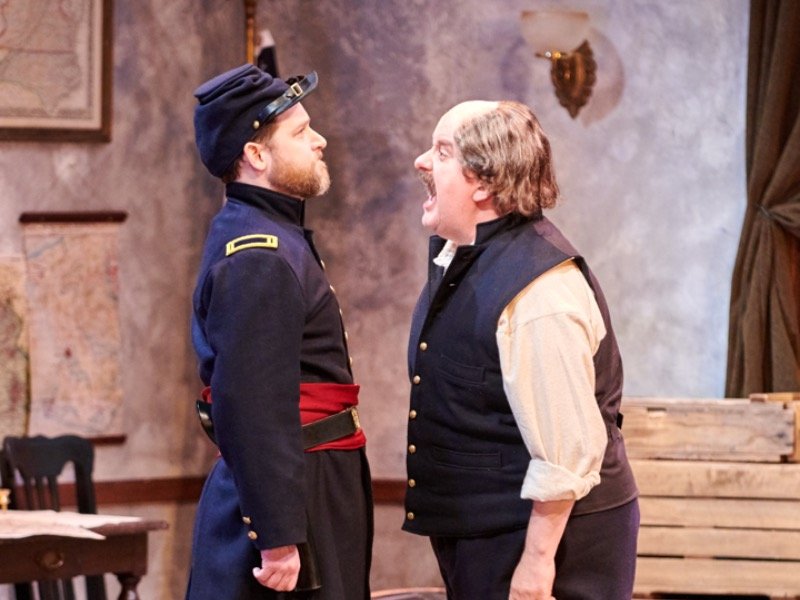There are not a lot of stories about the American Civil War that are filled with laughs. But that’s the set up for "Ben Butler," even as the play addresses a little known and pivotal moment at the beginning of the conflict. With a universally strong cast, agile directing by Michael Cotey and a lot of levity, Milwaukee Chamber Theatre’s final show of the season – part history lesson, part farce – runs through April 28 on the Cabot stage of the Broadway Theatre Center.
According to Cotey’s director’s notes, playwright Richard Strand was reading a biography of Abraham Lincoln and found the story of a legal loophole that Union General Benjamin Butler used to give runaway slaves sanctuary in the fort he was commanding in Virginia shortly after the war began. Fascinated with this "technicality" that fundamentally changed the course of the war, Strand wrote a "what if" play, based loosely on actual events.
What if General Butler was a bundle of contradictions: a military commander with no real experience, a brash and bellowing man who was also plagued with self-doubt and a lack of confidence? What if Butler’s decision to grant runaway slaves asylum was influenced heavily by conversations with one of the black petitioners, who was secretly taught to read and had an uncanny grasp on legal issues? What if the landmark decision to define slaves as contraband – property seized from the enemy during wartime – wasn’t the calculated wranglings of an experienced trial lawyer, but instead an accidental discovery in the midst of a heated argument? What if General Butler had serious misgivings about the impact his decision would have on his own military and political career, not to mention the rest of the war effort? What if Butler’s acts were heroic, in spite of himself?
Far from a Wikipedia entry bogged down with facts, and very far from a historical recreation of the moment, "Ben Butler" takes these questions and turns the story into a farce, pumping up the ridiculous personalities and foibles of all the participants, who are accidentally involved in an enormously important historical moment. The result is a sitcom in period costumes, re-imagining characters with exaggerated mannerisms but with dilemmas and speech patterns that sound very contemporary.
As the opening night audience would attest, the show is funny, with some particularly good callbacks in the second act. But getting there feels slow and laborious at times; the play’s opening and its finale are particularly tedious. And while the subject matter is interesting, it’s played for humor instead of intellectual engagement. Like a student stretching the content of their paper to hit an ambitious page count, "Ben Butler" is two-hour version of a 20-minute story that still feels under-explored when the curtain comes down.
As General Ben Butler, Drew Brhel is completely in his element. He balances Butler’s insecurity in his new command with his "demand" to be obeyed, his interest in doing the right thing with his fear of rocking the Union boat. One moment he is haranguing his lieutenant about how to address him, blood pressure rising and jowls flapping. The next he is imploring the same soldier to help him with his top coat and ceremonial sword – an ill-fitting uniform that he is not yet comfortable wearing and a weapon that gets in the way like a large piece of costume jewelry. In the general’s moments of doubt, Brhel practically collapses after a showdown with a Confederate major. This makes the character funny and fallible, pleasantly complicating the historical figure who was known as a "beast" later in his career, while Union forces occupied New Orleans.
Though he swears he’s "no abolitionist," Brhel’s Butler is irked by the speeches of Shepard Mallory, portrayed with playful antagonism by Marques Causey. Another collection of contradictions, Mallory is fearless when demanding his freedom from Butler but terrified that the general will let slip that the slave knows how to read. He bears the scars of many horrendous lashings, but refuses to cower in front of the man who holds his life and future in his hands. Causey blends charm and relentless persistence to create this fearless debater, a calculating man who knows how to get under the general’s skin. Though the character easily morphs into the stereotype of a simple, obedient slave when necessary, Causey’s Mallory is uncompromising in his goals: his personal freedom and his opportunity to fight for the Union cause. Former slaves would not be given that opportunity until later in the war, but Shepard’s request for asylum undoubtedly was a bold first step on that path.
As the by-the-book Lieutenant Kelly, who knows much more about military protocol than his new boss does, Chase Stoeger is perfectly stiff. His every movement is crisp and correct, and he quick to draw his gun when he feels a fellow soldier might be threatened. After initially expressing his dislike for Mallory – the first black man he ever met – Stoeger’s Kelly has a somewhat unbelievable change of heart in Act Two, but this way he can be on the right side of history.
As the self-satisfied Confederate Major Cary who comes to the fort to demand the runaway slaves be returned to their owner, David Sapiro is a walking Southern drawl. Relaxed and elegant, conserving his energy for a real fight ahead, Sapiro preens while Brhel’s Butler stalls, frantically looking for a way to keep the black fugitives from leaving with the enemy. When Sapiro’s easy confidence that he has the upper hand is shattered, it feels like a victory for everyone onstage.
In his program notes, Cotey recommends several books for patrons who would like to learn more about the event that inspired the play. I would echo that recommendation wholeheartedly, even though there will be markedly fewer laughs.







